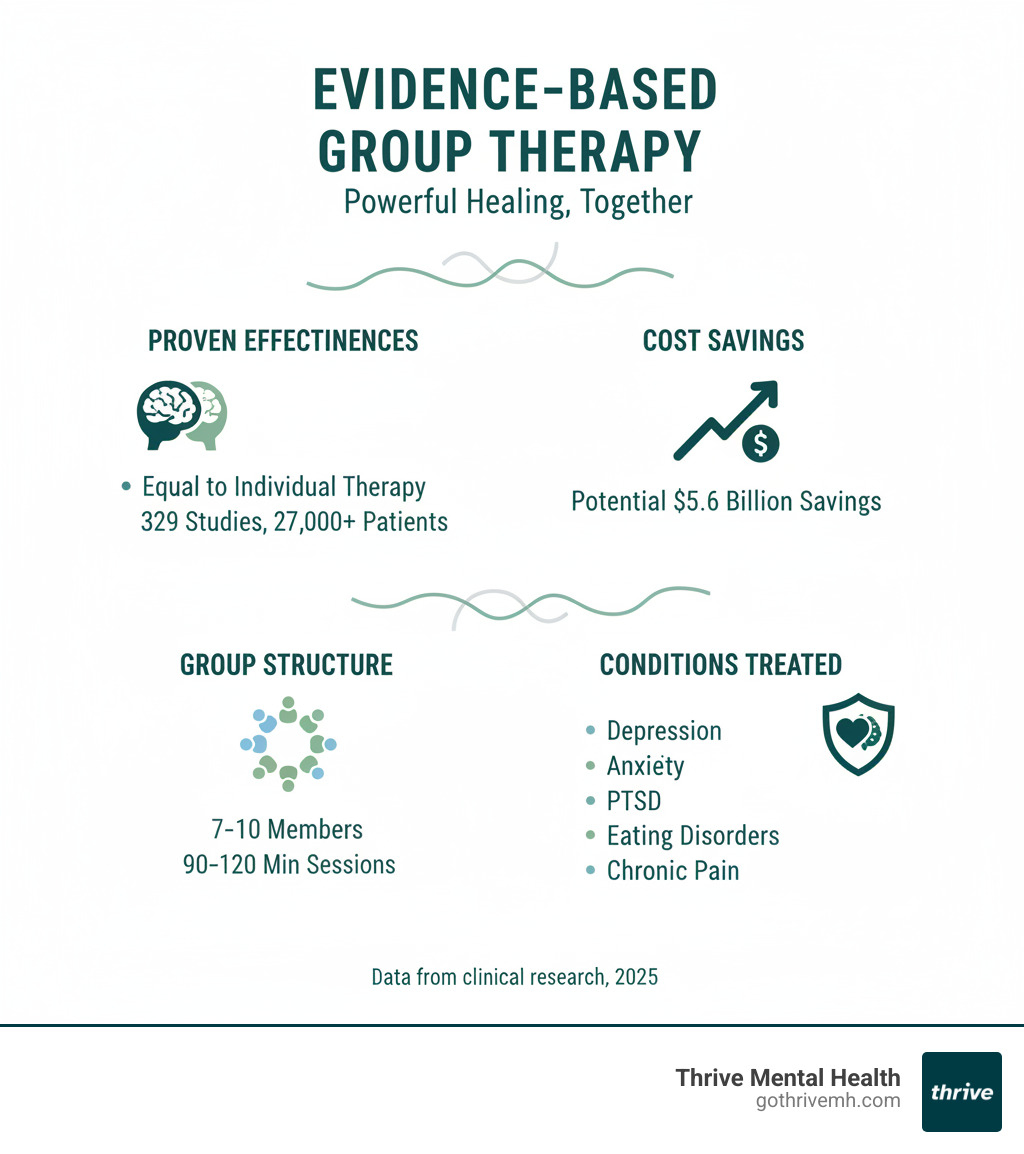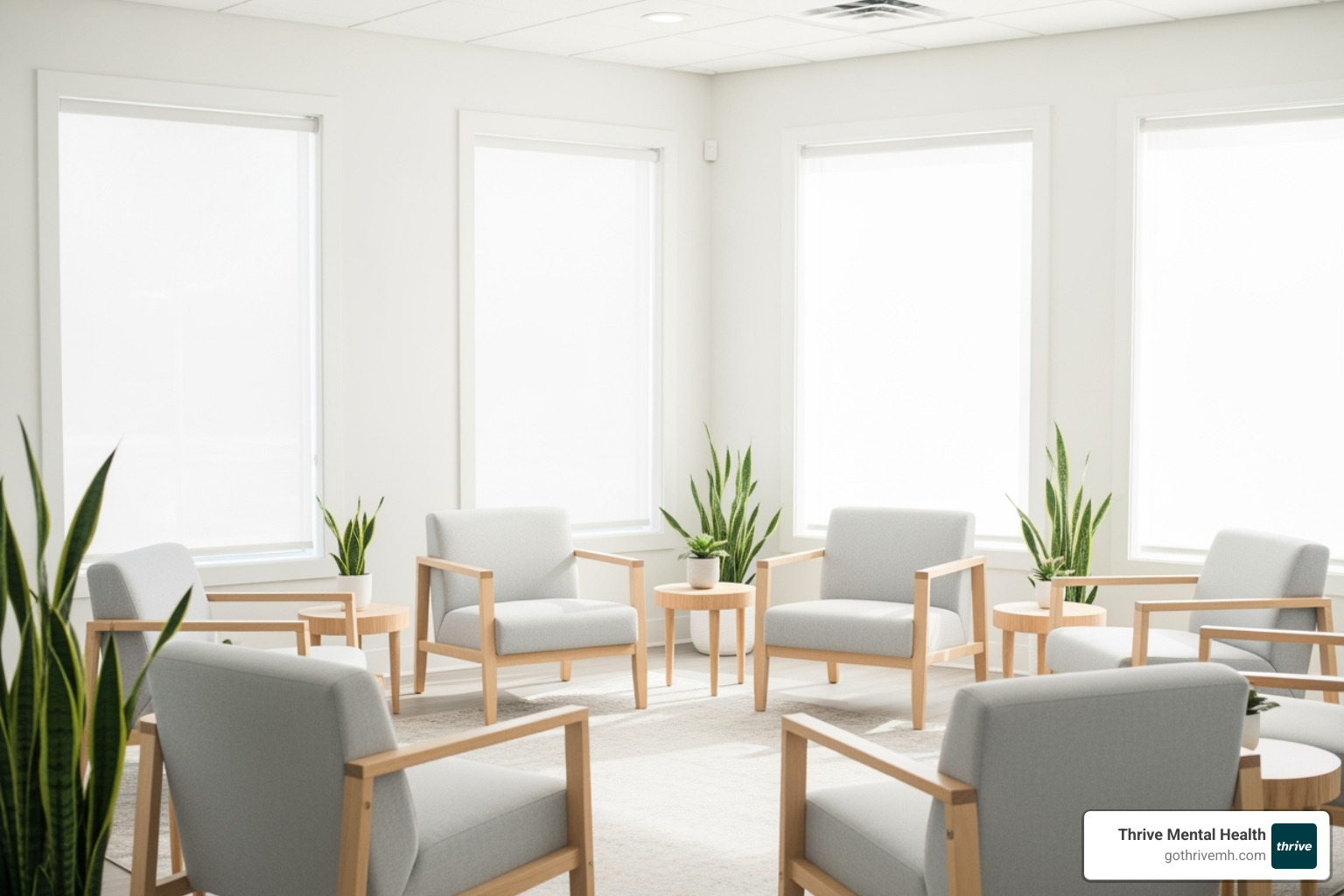Better Together: Exploring Evidence-Based Group Therapy Options

Stop Waiting for Therapy: Evidence-Based Group Therapy Gets 1:1 Results at Lower Cost [2025]
Why Healing Together Works Better Than Going It Alone
Evidence-based group therapy combines proven treatment methods with the power of peer connection to treat mental health conditions effectively. Here’s what you need to know:
What It Is:
- Structured therapy sessions led by licensed professionals
- Uses research-backed techniques (CBT, DBT, IPT)
- Typically 6-10 people with similar challenges
- Meets regularly (usually 90-120 minutes per session)
Why It Works:
- As effective as individual therapy for depression, anxiety, PTSD, and more
- More efficient – a single therapist can help multiple people at once
- Unique benefits – reduces isolation, builds social skills, creates hope
- Cost-effective – could save $5.6 billion in healthcare costs
Who Benefits:
People dealing with depression, anxiety, trauma, eating disorders, substance use, chronic pain, grief, and relationship issues.
For busy professionals, group therapy offers flexible evening options and the efficiency of addressing multiple needs in one session. The evidence is clear: group therapy isn’t a compromise. It’s a powerful treatment that offers something individual therapy cannot—the profound realization that you are not alone. Hundreds of clinical trials have proven that we heal better together.
I’m Anna Green, LMHC, LPC, Chief Clinical Officer at Thrive Mental Health, where I lead evidence-based group therapy programs. My experience has shown me how group work accelerates healing by combining clinical rigor with genuine human connection.

Evidence-based group therapy terms to remember:
- United Healthcare partial hospitalization
- United Healthcare mental wellness
- United Healthcare virtual therapy
What is Evidence-Based Group Therapy and Why Does It Matter?
Evidence-based group therapy is more than just sharing feelings in a circle. “Evidence-based” means the techniques used, like Cognitive Behavioral Therapy (CBT) or Dialectical Behavior Therapy (DBT), have been scientifically proven to work through rigorous research. It’s structured treatment backed by data, combining this scientific foundation with a therapist’s clinical expertise and your individual preferences.
Group therapy’s roots trace back to the early 1900s, but it became essential after World War II to support returning soldiers. What began as a practical solution proved to be powerfully therapeutic. This culminated in 2018 when the American Psychological Association formally recognized Group Psychology and Group Psychotherapy as a specialty. This ensures group leaders have specialized training in managing group dynamics, which is crucial for effective healing. The scientific research on group vs. individual therapy was key to this recognition. For more, see the American Group Psychotherapy Association.
The “Evidence” in Evidence-Based Group Therapy
While Randomized Controlled Trials (RCTs) are the gold standard for research, they don’t tell the whole story in a group setting. They can’t always capture the complex, real-world dynamics of people healing together.
That’s why at Thrive Mental Health, our approach to evidence-based group therapy also includes practice-based evidence. We use routine outcome monitoring to track patient progress in real-time and adapt our methods accordingly. We also recognize that the therapeutic relationship—the bond between you, your therapist, and other group members—is a powerful predictor of success, just as important as the clinical technique itself. Learn more about our evidence-based approach.
How Group Therapy Became a Recognized Specialty
The 2018 APA recognition was a turning point, formalizing that leading a group requires specialized skills beyond general therapy training. It’s about managing group dynamics, navigating conflict, and creating a safe space for vulnerability.
Today, therapists can pursue specialized training and certification in group work. This professionalization means that when you join a group at Thrive, you’re getting an expert in group facilitation. Our therapists leading Intensive Outpatient Programs (IOP) and Partial Hospitalization Programs (PHP) are trained in the science and art of group therapy to ensure you get the most out of the experience.
The Proven Benefits: Why Groups Can Be More Powerful Than You Think
The saying “strength in numbers” is especially true in evidence-based group therapy. It provides a unique mix of healing woven from shared experiences and mutual support, addressing our fundamental need for connection.
By the Numbers: The Striking Efficiency of Group Therapy
Group therapy isn’t just effective; it’s incredibly efficient. Meeting the current unmet mental health need with group therapy could save over $5.6 billion and require 34,473 fewer therapists. If just 10% of this need were met by groups, 3.5 million more people could receive care. This efficiency doesn’t compromise quality; meta-analyses consistently show group therapy is as effective as individual therapy for many conditions.
| Metric | Individual Therapy | Group Therapy |
|---|---|---|
| Effectiveness for Depression | Highly effective | Highly effective (equivalent) |
| Efficiency (Therapist time) | 1:1 client-to-therapist ratio | 6-10:1 client-to-therapist ratio |
| Cost to System | Higher per client | Lower per client (potential $5.6B savings) |
| Access to Care | Limited by therapist availability | Expands access, treats more people |
| Social Skill Development | Indirect, through discussion | Direct, through interaction and feedback |
| Sense of Universality | Limited to therapist’s validation | Strong, through peer sharing |
The Unique Therapeutic Factors of a Group Setting
Group therapy’s power comes from therapeutic factors that are hard to replicate one-on-one:
- Universality: The powerful realization that you are not alone in your struggles, which reduces isolation and shame.
- Instillation of Hope: Witnessing peers improve provides tangible proof that recovery is possible.
- Imparting Information: Gaining knowledge from the therapist and practical advice from peers.
- Altruism: The therapeutic act of helping others, which boosts self-esteem and provides a sense of purpose.
- Corrective Recapitulation of Primary Family Group: Working through old family dynamics in a safe, supportive environment.
- Development of Socializing Techniques: Practicing new social and communication skills in a real-time, low-stakes setting.
- Interpersonal Learning: Gaining self-awareness through feedback from others and by trying new ways of relating.
- Group Cohesion: The sense of belonging and trust among members, a strong predictor of positive outcomes.
These factors create a dynamic experience that helps individuals not just cope, but truly flourish.
Who Can Benefit? Conditions Effectively Treated with Group Therapy
Evidence-based group therapy is effective for a remarkably wide range of challenges. Groups can be homogeneous (focused on a specific issue like depression) or heterogeneous (with diverse members), depending on your goals. At Thrive Mental Health, our Intensive Outpatient Programs (IOP) use various group formats to create a comprehensive support system.

Conditions Where Group Therapy Is Highly Effective
Research shows group therapy delivers meaningful results for many conditions:
- Depression and Bipolar Disorders: Group CBT and IPT help counter isolation and build coping strategies alongside others who understand.
- Anxiety Disorders: Group CBT provides a safe space to practice challenging anxious thoughts and behaviors in real-time, especially for social anxiety.
- PTSD and OCD: Trauma-focused groups help survivors process events and develop coping skills in a supportive community.
- Eating Disorders and BPD: Groups address body image, emotional regulation, and interpersonal skills. DBT skills groups are particularly transformative for BPD.
- Substance Use Disorders: Groups foster accountability, teach relapse prevention, and build a crucial support network for recovery.
- Chronic Pain and Grief: These groups help people cope with the psychological impact of health challenges or loss, providing a space to process complex emotions and find meaning.
Is Group Therapy Right for You?
Your readiness and motivation for change are key. While many worry about sharing in a group, most find the environment to be genuinely supportive. We carefully assess if a group is the right fit, sometimes using tools like the Group Readiness Questionnaire as a guide. For some, individual therapy may be a better starting point. The goal is to find the path that best supports your healing.
For those needing more intensive support, our Partial Hospitalization Programs (PHP) offer comprehensive care that includes group therapy. We’re here to help you find the right level of care for your journey.
Inside a Successful Group Session: From Cohesion to Conflict Resolution
A successful evidence-based group therapy session is a careful blend of structure and spontaneity. Each 90- to 120-minute session typically follows a rhythm: a check-in to get started, a middle “working” phase for deeper engagement, and a closing to consolidate insights. This all happens within a framework of clear ground rules, with confidentiality as the sacred foundation for trust.
Building the Foundation: Fostering Cohesion and Trust
Cohesion—a sense of mutual trust and belonging—is critical for success. It’s what allows members to be vulnerable. We build this intentionally by collaboratively setting ground rules, especially around confidentiality. Research confirms that group cohesion is a powerful predictor of positive outcomes. We cultivate this through empathy, active listening, and creating an environment where it’s safe to be imperfect and grow.
Navigating Diversity, Equity, and Inclusion in Groups
Our groups are spaces where all identities are seen and valued. We recognize that members bring unique experiences related to their culture, race, sexuality, and other intersecting identities. Our therapists are trained in multicultural orientation to create genuine safety. When microaggressions occur, we address them therapeutically to promote learning and restore trust. This commitment to DEI&B isn’t just ethical; it’s essential for effective evidence-based group therapy.
The Rise of Virtual Groups: Challenges and Opportunities
Virtual group therapy has proven to be a powerful and accessible option. A meta-analysis found that video teleconference groups achieve similar outcomes to in-person sessions. For busy professionals or those with geographic barriers, virtual groups are transformative.
While building cohesion online requires more intentional effort, the challenges are manageable. We use clear ground rules for technology and our therapists are skilled at navigating the virtual space. At Thrive, we offer virtual group therapy sessions that bring expert-led care directly to you.
Whether in person or online, the heart of group therapy remains the same: people supporting people, guided by skilled clinicians, creating a space where healing happens together.
Making Group Therapy Accessible in Florida
We work hard to make evidence-based group therapy accessible throughout Florida. Most major insurance plans provide coverage, and we are in-network with Cigna, Optum, Florida Blue, Aetna, and United Healthcare, among others. Our team can help you understand your benefits. You can verify your insurance in 2 minutes on our website or call us at 561-203-6085.
We have physical locations across the state, including Tampa Bay, St. Petersburg, Miami, and Orlando, making it convenient to find expert care near you.
Our virtual and hybrid programs also mean you don’t have to live near a physical location to get help. With evening sessions designed to fit busy schedules, you don’t have to choose between your career and your mental health. This combination of in-network insurance, multiple Florida locations, and statewide virtual access puts quality group therapy within reach.
A Note on Crisis and Self-Harm:
If you are in crisis or considering self-harm, please call or text the 988 Suicide & Crisis Lifeline. You can connect with people who can support you by calling or texting 988 anytime in the US and Canada. It is free and confidential. You are not alone.
Frequently Asked Questions about Evidence-Based Group Therapy
Here are straight answers to the most common questions about evidence-based group therapy.
What is an example of evidence-based group therapy?
Two powerful examples are Cognitive Behavioral Therapy (CBT) groups and Dialectical Behavior Therapy (DBT) groups. CBT groups help you identify and change negative thought patterns and behaviors. DBT groups are skills-focused, teaching techniques for emotion regulation, distress tolerance, mindfulness, and interpersonal effectiveness. They are especially effective for BPD but benefit anyone feeling emotionally overwhelmed.
What are the main goals of group therapy?
The main goals are to reduce symptoms (like depression or anxiety), improve relationships, and increase self-awareness. A key goal is also to counter isolation by creating a safe environment where you realize you’re not alone in your struggles—a concept called universality. In a group, you can practice new skills and get real-time feedback from peers who understand.
Is group therapy as effective as individual therapy?
Yes. For a wide range of conditions like depression, anxiety, and PTSD, major research studies show that group therapy is just as effective as individual therapy. The outcomes are equivalent. Furthermore, group therapy offers unique benefits that individual therapy cannot, such as peer support, the chance to practice social skills in a safe setting, and the hope that comes from seeing others progress on their healing journey. It’s not a “second-best” option; it’s a powerful treatment in its own right.
If you’re ready to explore if group therapy is right for you, our team at Thrive Mental Health can help. We offer virtual and in-person options through our Intensive Outpatient Programs (IOP) and Partial Hospitalization Programs (PHP). Call us at 561-203-6085 to discuss your options.
Conclusion: Find Your Strength in Community
Evidence-based group therapy is a powerful, efficient, and highly effective treatment modality that offers unique benefits not found in individual therapy. By fostering a sense of belonging, universality, and hope, it provides a dynamic environment for healing and growth. From managing specific disorders to cultivating positive psychological strengths, the evidence is clear: we are often better together.
Ready to find support in Florida? Thrive Mental Health offers virtual and in-person IOP/PHP programs across the state, with convenient evening options. Verify your insurance in 2 minutes (no obligation) or call 561-203-6085. If you’re in crisis, call/text 988.
Suggested JSON-LD FAQ Schema:
{
"@context": "https://schema.org",
"@type": "FAQPage",
"mainEntity": [{
"@type": "Question",
"name": "What is an example of evidence-based group therapy?",
"acceptedAnswer": {
"@type": "Answer",
"text": "Cognitive Behavioral Therapy (CBT) and Dialectical Behavior Therapy (DBT) groups are two prominent examples. CBT groups help members identify and change negative thought patterns and behaviors, while DBT groups focus on teaching skills for emotion regulation, distress tolerance, mindfulness, and interpersonal effectiveness, particularly for conditions like BPD."
}
},{
"@type": "Question",
"name": "What are the main goals of group therapy?",
"acceptedAnswer": {
"@type": "Answer",
"text": "The primary goals are to reduce symptoms, improve interpersonal functioning, and increase self-awareness. It aims to provide a safe environment where members can gain insight, practice new behaviors, and receive feedback, ultimately fostering a sense of universality and reducing feelings of isolation."
}
},{
"@type": "Question",
"name": "Is group therapy as effective as individual therapy?",
"acceptedAnswer": {
"@type": "Answer",
"text": "Research, including numerous meta-analyses, shows that for a wide range of conditions like depression, anxiety, and PTSD, group therapy is as effective as individual therapy. It also offers unique benefits, such as peer support and the opportunity to improve social skills in a real-world setting."
}
}]
}
